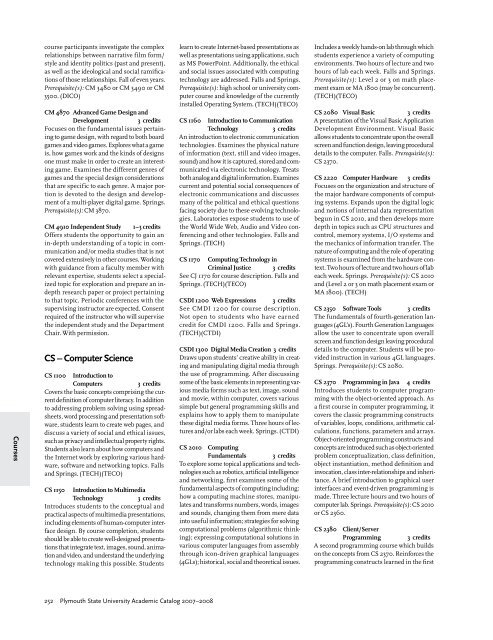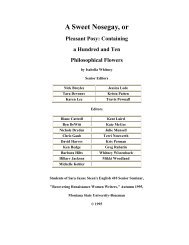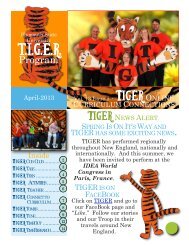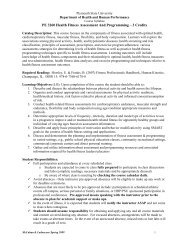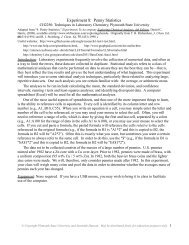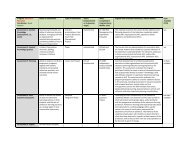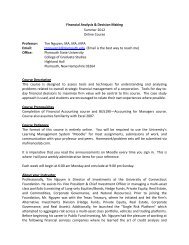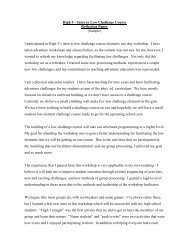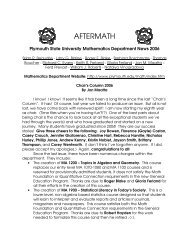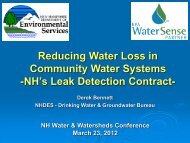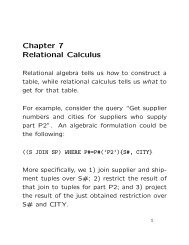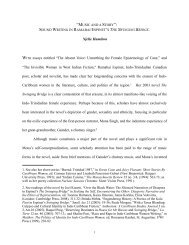2007-2008 Undergraduate Academic Catalog - Plymouth State ...
2007-2008 Undergraduate Academic Catalog - Plymouth State ...
2007-2008 Undergraduate Academic Catalog - Plymouth State ...
- No tags were found...
Create successful ePaper yourself
Turn your PDF publications into a flip-book with our unique Google optimized e-Paper software.
Coursescourse participants investigate the complexrelationships between narrative film form/style and identity politics (past and present),as well as the ideological and social ramificationsof those relationships. Fall of even years.Prerequisite(s): CM 3480 or CM 3490 or CM3500. (DICO)CM 4870 Advanced Game Design andDevelopment 3 creditsFocuses on the fundamental issues pertainingto game design, with regard to both boardgames and video games. Explores what a gameis, how games work and the kinds of designsone must make in order to create an interestinggame. Examines the different genres ofgames and the special design considerationsthat are specific to each genre. A major portionis devoted to the design and developmentof a multi-player digital game. Springs.Prerequisite(s): CM 3870.CM 4910 Independent Study 1–3 creditsOffers students the opportunity to gain anin-depth understanding of a topic in communicationand/or media studies that is notcovered extensively in other courses. Workingwith guidance from a faculty member withrelevant expertise, students select a specializedtopic for exploration and prepare an indepthresearch paper or project pertainingto that topic. Periodic conferences with thesupervising instructor are expected. Consentrequired of the instructor who will supervisethe independent study and the DepartmentChair. With permission.CS – Computer ScienceCS 1100 Introduction toComputers3 creditsCovers the basic concepts comprising the currentdefinition of computer literacy. In additionto addressing problem solving using spreadsheets,word processing and presentation software,students learn to create web pages, anddiscuss a variety of social and ethical issues,such as privacy and intellectual property rights.Students also learn about how computers andthe Internet work by exploring various hardware,software and networking topics. Fallsand Springs. (TECH)(TECO)CS 1150 Introduction to MultimediaTechnology3 creditsIntroduces students to the conceptual andpractical aspects of multimedia presentations,including elements of human-computer interfacedesign. By course completion, studentsshould be able to create well-designed presentationsthat integrate text, images, sound, animationand video, and understand the underlyingtechnology making this possible. Studentslearn to create Internet-based presentations aswell as presentations using applications, suchas MS PowerPoint. Additionally, the ethicaland social issues associated with computingtechnology are addressed. Falls and Springs.Prerequisite(s): high school or university computercourse and knowledge of the currentlyinstalled Operating System. (TECH)(TECO)CS 1160 Introduction to CommunicationTechnology3 creditsAn introduction to electronic communicationtechnologies. Examines the physical natureof information (text, still and video images,sound) and how it is captured, stored and communicatedvia electronic technology. Treatsboth analog and digital information. Examinescurrent and potential social consequences ofelectronic communications and discussesmany of the political and ethical questionsfacing society due to these evolving technologies.Laboratories expose students to use ofthe World Wide Web, Audio and Video conferencingand other technologies. Falls andSprings. (TECH)CS 1170 Computing Technology inCriminal Justice 3 creditsSee CJ 1170 for course description. Falls andSprings. (TECH)(TECO)CSDI 1200 Web Expressions 3 creditsSee CMDI 1200 for course description.Not open to students who have earnedcredit for CMDI 1200. Falls and Springs.(TECH)(CTDI)CSDI 1300 Digital Media Creation 3 creditsDraws upon students’ creative ability in creatingand manipulating digital media throughthe use of programming. After discussingsome of the basic elements in representing variousmedia forms such as text, image, soundand movie, within computer, covers varioussimple but general programming skills andexplains how to apply them to manipulatethese digital media forms. Three hours of lecturesand/or labs each week. Springs. (CTDI)CS 2010 ComputingFundamentals 3 creditsTo explore some topical applications and technologiessuch as robotics, artificial intelligenceand networking, first examines some of thefundamental aspects of computing including:how a computing machine stores, manipulatesand transforms numbers, words, imagesand sounds, changing them from mere datainto useful information; strategies for solvingcomputational problems (algorithmic thinking);expressing computational solutions invarious computer languages from assemblythrough icon-driven graphical languages(4GLs); historical, social and theoretical issues.Includes a weekly hands-on lab through whichstudents experience a variety of computingenvironments. Two hours of lecture and twohours of lab each week. Falls and Springs.Prerequisite(s): Level 2 or 3 on math placementexam or MA 1800 (may be concurrent).(TECH)(TECO)CS 2080 Visual Basic 3 creditsA presentation of the Visual Basic ApplicationDevelopment Environment. Visual Basicallows students to concentrate upon the overallscreen and function design, leaving proceduraldetails to the computer. Falls. Prerequisite(s):CS 2370.CS 2220 Computer Hardware 3 creditsFocuses on the organization and structure ofthe major hardware components of computingsystems. Expands upon the digital logicand notions of internal data representationbegun in CS 2010, and then develops moredepth in topics such as CPU structures andcontrol, memory systems, I/O systems andthe mechanics of information transfer. Thenature of computing and the role of operatingsystems is examined from the hardware context.Two hours of lecture and two hours of labeach week. Springs. Prerequisite(s): CS 2010and (Level 2 or 3 on math placement exam orMA 1800). (TECH)CS 2350 Software Tools 3 creditsThe fundamentals of fourth-generation languages(4GL’s). Fourth Generation Languagesallow the user to concentrate upon overallscreen and function design leaving proceduraldetails to the computer. Students will be providedinstruction in various 4GL languages.Springs. Prerequisite(s): CS 2080.CS 2370 Programming in Java 4 creditsIntroduces students to computer programmingwith the object-oriented approach. Asa first course in computer programming, itcovers the classic programming constructsof variables, loops, conditions, arithmetic calculations,functions, parameters and arrays.Object-oriented programming constructs andconcepts are introduced such as object-orientedproblem conceptualization, class definition,object instantiation, method definition andinvocation, class inter-relationships and inheritance.A brief introduction to graphical userinterfaces and event-driven programming ismade. Three lecture hours and two hours ofcomputer lab. Springs. Prerequisite(s): CS 2010or CS 2360.CS 2380 Client/ServerProgramming 3 creditsA second programming course which buildson the concepts from CS 2370. Reinforces theprogramming constructs learned in the first252 <strong>Plymouth</strong> <strong>State</strong> University <strong>Academic</strong> <strong>Catalog</strong> <strong>2007</strong>–<strong>2008</strong>


